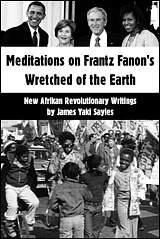
By James Yaki Sayles
(Kersplebedeb, 2010)
Reviewed by Ernesto Aguilar
Frantz Fanon’s The Wretched of the Earth, a searing indictment of global racism, colonialism and imperialism, is among the foundational writings of postcolonial theory. Originally written in 1961, Wretched stands out among Fanon’s writings, which collectively examine the impact of oppression on the psyche of subjugated people. Most notably, Fanon dug into how institutional mistreatment colors marginalized communities’ members’ ideas of themselves, their potential and resistance.
However, Fanon is by no means an easy writer to access. Black Panther Party activist David Hilliard wrote in his autobiography, This Side of Glory, of struggling to understand Fanon’s lofty prose. He is not alone, and, for a generation of organizers that desperately need to apply Fanon’s writings, it should be a priority to seize Wretched out of the graduate lounge and into the streets. Thus, when writers take on the formidable challenge of making Frantz Fanon understandable to a broad, non-academic and contemporary audience, such works are really nothing short of extraordinary.
With Meditations on Frantz Fanon’s The Wretched of the Earth, its late author, James Yaki Sayles, creates an engrossing portrait of a living theoretical lens for understanding a lexicon of contemporary politics, from modern capital to immigration to race and globalization. In it, Sayles does more than interpret Fanon’s meanings, but dives headfirst into helping readers digest the meaning of what Fanon conveys. At several turns, Meditations literally does the job line by line. If Fanon is only a historical footnote to many readers, Sayles gives a vivid glimpse into an ideological framework informed by Fanon’s vision, sped up for a world more caught up in crisis than when Fanon penned Wretched years ago.
Formerly writing under the name Owusu Yaki Yakubu, Sayles himself is no stranger to radical political theory. A frequent contributor to the Crossroad Support Network’s journal as well as various circles within the New Afrikan Independence Movement, Sayles wrote extensively about Fanon’s theories of revolutionary violence and political independence. Incarcerated from age 17, Sayles’ political education came through prison study and struggle with fellow imprisoned comrades. And it is his non-academic orientation that makes Sayles a perfect writer for explaining Fanon to readers who might not otherwise be equipped to fully discover his prose. Not disposed to GRE essays, Sayles matter-of-factly recounts instances of seeking out a thesaurus to figure out a comment, and frequently does a sterling job of providing the historical, social and political context in which Fanon wrote some passages. In Sayles’ deft hands, Wretched is more than a rallying cry against French colonialism and revolt against their rule by any means, but a blueprint for oppressed people to mobilize revolutionary classes and apply necessary lessons.
How yesterday’s Third World uprisings and Black revolutionary ferment in the First World as well as today’s preeminent questions of race, class and gender play heavily in Sayles’ lessons. For organizers, Sayles’ method is sure to help make a complex theorist relatable. The author is also open in seeing Fanon’s work not simply as a bit of history, but also as a bellwether of how oppressed people go from reaction to revolution. “This exercise is about more than our desire to read and understand Wretched,” Sayles writes. “This exercise is also about us, and about some of the things that we need to understand and to change in ourselves and our world.” Sayles’ Meditations is one of the most effective instructions on Fanon available, and a quintessential polemic for another world.

Thu, Jun 3, 2010
Education, Globalization, Publication Reviews